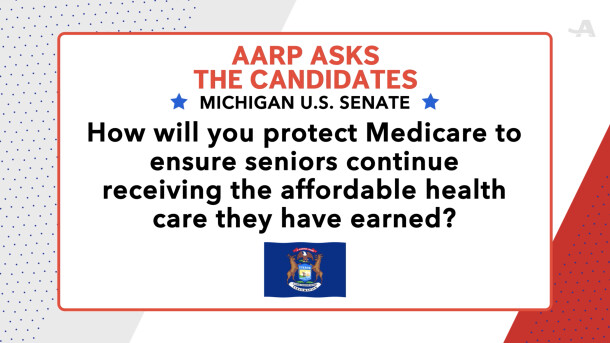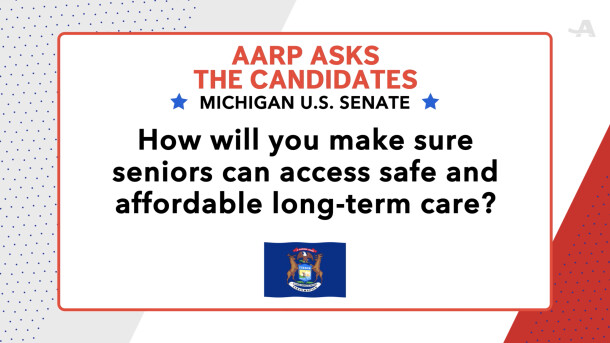AARP Hearing Center

Incumbent Sen. Gary Peters (D) of Michigan faces a tough battle for reelection in November, as he’s challenged by Republican candidate John James, a business owner and Iraq War veteran from Detroit.
To understand how they plan to protect Social Security and Medicare, stimulate the economy, lower prescription drug prices and ensure that Americans have access to affordable long-term care, AARP Michigan asked each candidate to answer five key questions in 60-second videos. Here are their responses, with transcripts.
1. Social Security is a self-financed, off-budget program that half of all seniors rely on for more than 50 percent of their income. If elected, how will you ensure that current and future Social Security benefits are not cut as part of deficit reduction?

James: After a lifetime of hard work, we must protect Social Security and Medicare from career politicians who will raid today what they promised yesterday. We must stop any attempt to underfund the Social Security trust fund, and we cannot cut our senior citizens’ benefits. There’s a lot of uncertainty for our seniors right now, and the last thing they should need to worry about is making sure the government keeps its promises. People from my parents’ generations built this country. They fought [for] and defended this country. They revolutionized industries and created new ones. They saved Europe twice. The least we can do is keep our promises to them and provide a strong social safety net. But beyond that, we must strengthen that safety net and make sure the next generation is not getting tangled in the messes left behind by career politicians who are more willing to look out for themselves than look out for us. I spent half of my adult life in the Army, the other half running a family business. I know how to solve tough problems for you.
Peters: With so many seniors relying on Social Security benefits to pay their bills and put food on the table, I am proud of my record of fighting for this program. We must maintain our steadfast commitment to ensuring all Americans who have contributed their fair share into the Social Security system can count on receiving their hard-earned benefits for a dignified retirement. Social Security has never missed a payment during its over 80 years in existence. And although I support taking bipartisan action to ensure solvency for future generations, we must do so in a way that does not put Social Security benefits in jeopardy. That is why I oppose proposals such as raising the retirement age, privatizing Social Security or using the chained consumer price index for determining benefit rates. I also support addressing provisions in current law that have led to very little or no cost-of-living adjustments for recipients in recent years. With so many Michiganders and folks across the country who depend on these benefits, defending Social Security will always be a priority for me.
2. On average, health care already accounts for $1 out of every $6 spent by seniors. If elected, how will you protect Medicare from benefit cuts, lower health care costs and ensure seniors continue receiving the affordable care they have earned?

Peters: I have consistently opposed efforts to cut Medicare or put benefits at risk, including proposals to create a voucher system or raise the eligibility age. In December of 2017, I fought against a tax bill that risked putting Medicare in jeopardy and will add over $1.5 trillion to the national debt to fund tax breaks for the wealthy. And during my first term in Congress, I helped pass Medicaid expansion as part of the ACA, and I have fought to defend it ever since. With over 750,000 individuals relying on Michigan’s Medicaid expansion plan, it is an essential program for many Michiganders, particularly children, seniors and people with disabilities. I’m proud of my record of fighting for Medicare, and I look forward to continuing this critical work of making sure more folks in Michigan have access to quality, affordable health care.
James: I run an automotive supplier where I make sure my employees have access to the same insurance plan that my own family and I are on. I want to reform the parts of the Affordable Care Act that increase the cost of health care. We need to fix that. We need to fix the parts that give too many decisions to the government and offer patients too few options. Michiganders have a right to own their own health care. We need to have a market-based, patient-centered approach that must cover people with preexisting conditions. Whatever plan I support must include tort reform and regulatory reform in a manner that lowers cost while increasing quality of care. We have to increase transparency and competition to get the best care for folks. We have to emphasize preventative care and more wellness coverage — including nutrition and fitness — and health insurance options that are affordable and increase access. After a lifetime of hard work, we have to protect Medicare from career politicians who will raid today what they promised yesterday.
3. Unemployment during the coronavirus crisis reached the highest levels since the Great Depression, and older Americans have been disproportionately affected. If elected, how will you help Americans over the age of 50 recover economically from the effects of the coronavirus?

James: The economic recovery of Michiganders over the age of 50 is something that’s very personal for me. As a business owner in Detroit with several employees over the age of 50, I’ve seen firsthand how the coronavirus pandemic has been devastating, not only as a health crisis but as an economic crisis in Michigan as well. This has created uncertainty for our seniors who may have been looking to transition back into the workforce due to their financial status. We must also ensure broadband and internet access is available to those in rural areas. New opportunities to work from home and new technology to virtually visit family members require high internet speed. We must expand access to everyone in Michigan — rural areas, not just big cities. Unemployment during the coronavirus pandemic has reached the highest levels since the Great Depression, and older Michiganders have been disproportionately affected. We must also develop policies that support widespread access to lifelong learning and education. This will address narrowing the job gap and increasing options for our older workers.
Peters: Now, more than ever, as we face an economic crisis and global pandemic, we need to do all we can to get Michiganders the relief that they need. That’s why I worked to secure unemployment assistance in the CARES Act for Michigan workers who had been furloughed or unemployed as a result of this crisis. And I’m continuing to fight to get additional relief for the many families still hurting even as parts of our economy reopen. I’ll be pressing to ensure those who remain furloughed or unemployed because of this pandemic have the resources and support that they need to get through this. From protecting sick leave to preventing age discrimination, I will work in a bipartisan manner to support opportunities for all Michiganders and their loved ones. I will keep fighting to ensure we support Michiganders over the age of 50 as we recover from this crisis.
4. Americans pay the highest prescription drug prices in the world. If elected, how will you cut prescription drug prices for all Americans?

Peters: The skyrocketing cost of prescription drugs is one of the biggest afflictions that many older Americans experience. No one should have to make the impossible decision of whether they pay for their medicine or their electric bill. So I’m working to fix it. That’s why I’ve advanced legislation that would lower the cost of prescription drugs by allowing Medicare to negotiate drug prices for seniors. This would increase transparency, keep drug companies accountable and lower prescription drug prices. And I introduced a bill that would require drug manufacturers to pay rebates to Medicare when prices for Part B drugs rise higher than the rate of inflation. In addition, I support legislation to prevent brand-name drug companies from keeping generic drugs off of the market by gaming the system to create a monopoly. I will never stop fighting to get all Michiganders access to the affordable medication that they need.
James: I will hold drug companies accountable for their prices. I won’t just deliver the tough talk. I will deliver results for Michigan families that need prescription drugs and suffer because most D.C. politicians are more concerned with stuffing their pockets and their bank accounts with profits from drug companies. We should also implement policies that offer overall improvement to our health. We must emphasize preventative care and more wellness coverage, including nutrition and fitness, and health insurance options that are affordable and increase access. And equally important is equipping our country with the tools we need to address future pandemics and outbreaks. We need to repatriate the manufacturing of critical medicines, health care equipment and PPE. We should not put our health care workers and patients in a position where they need to rely on other countries for these important resources. The COVID pandemic has proven that career politicians failed us. They did not properly prepare us for the crisis. But we’ll prepare for generations in the future.
5. COVID-19 has caused death and suffering for too many older Americans who require long-term care. If elected, how will you make sure seniors can access safe and affordable long-term care at home and in nursing homes and assisted living facilities?

James: We need smarter policies and more options for our seniors when it comes to housing and long-term care. Medicaid pays the bills for 60 percent of nursing home residents. Medicaid is a program where the federal government provides the funding and the states have some discretion in how they spend it. However, Medicaid currently does not allow states and seniors to redirect nursing home dollars toward programs like stay-at-home care. The COVID crisis has shown that shared environments and shared surfaces can be harmful for people with preexisting conditions and our seniors. Congress must pass reforms to allow seniors to have more flexible options when it comes to housing. It’s a moral and economic imperative, as well as a priority when it comes to public health. We must also do a better job of enforcing health and cleanliness standards at existing facilities and make sure that local leaders are equipped with the tools to handle future crisis events. This will make it so that we never have dangerous policies like we did in Michigan from our current elected officials.
Peters: I have and will continue to fight for safe and affordable health care for seniors all across Michigan. Nursing homes and assisted living centers need access to our resources and support to ensure they are offering the best care for our loved ones. And overworked and underpaid nursing home workers continue to face life-and-death decisions without adequate protection and supplies. That’s why, as ranking member on the Homeland Security and Government Affairs Committee, I introduced a bill to provide $20 billion to help states, nursing homes and intermediate care facilities contain the spread of the coronavirus. I also released a report on the impact of the coronavirus pandemic on residents and workers in nursing homes. I will do all I can to protect our seniors and those who work tirelessly to keep them safe, both now and when we make it through these challenging times.
AARP is committed to ensuring voters have the information they need to cast their ballot this year. That is why we are publishing the “AARP Asks the Candidates” voter guide series, so candidates can share their plans on issues important to 50-plus voters.
AARP has a proud 34-year history of non-partisan voter engagement and does not endorse or oppose candidates or make contributions to political campaigns or candidates.
Also of Interest































































